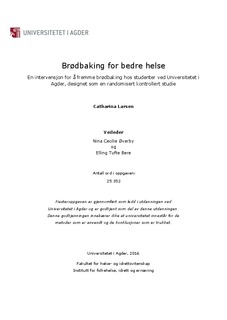Brødbaking for bedre helse : en intervensjon for å fremme brødbaking hos studenter ved Universitetet i Agder, designet som en randomisert kontrollert studie
Master thesis
Permanent lenke
http://hdl.handle.net/11250/2413066Utgivelsesdato
2016Metadata
Vis full innførselSamlinger
Sammendrag
Background: Students are challenged to make healthy and independent food choices. Unhealthy diets can increase the risk of non-communicable diseases, which constitutes a public health concern. Universities represents an arena for interventions to promote healthy dietary habits.
Aim: To investigate the effect of a bread baking intervention on (1) baking habits, (2) changes in motivation for bread baking and (3) assess if there was a correlation between changes in bread baking habits and motivation among university students.
Method: Students (18-43 years of age, 65 % women) was randomized into an intervention group (n=21) or control group (n=25). The intervention group was given a bread recipe, baking equipment and were encouraged to bake whole grain bread, during the four weeks’ intervention period. Baking habits and motivation were measured with questionnaires; at baseline, after two- and four weeks. Self-determination theory was used to evaluate motivation, and these statistical tests were used: Friedman, Mann-Whitney U, Wilcoxon, Spearman and Pearson Chi-square.
Results: Significant differences in bread baking between the groups at the second (p<0,001) and third (p=0,006) time point was shown. There were no significant changes in motivation in the intervention group, however a moderate, positive correlation (p=0,01) between the changes in bread baking habits and motivation was identified.
Conclusion: The intervention was effective in increasing whole grain bread baking among students, at least in short term. However, it was not sufficiently effective in increasing motivation for bread baking, however a correlation between changes in motivation and bread baking was observed.
Keywords: bread baking, motivation, students, UiA, self-determination theory
Beskrivelse
Masteroppgave folkehelsevitenskap - Universitetet i Agder 2016
